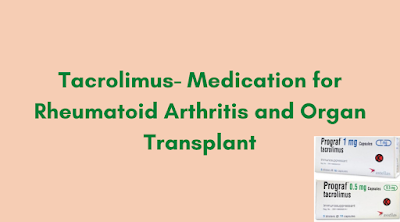Indication for Organ Transplant:
Tacrolimus is a prescription medicine used with other medicines in order to help prevent organ rejection in people who have had a kidney, liver, or heart transplant and Tacrolimus shouldn't be used with medicines called cyclosporine.It is not for use with a drug called sirolimus in people who have had a liver or heart transplants.
It is not known if it is safe and effective when used with sirolimus in people who have had kidney transplants.
It is not specified if this drug is safe and effective in children who have had a kidney or heart transplants.
It has identical immunosuppressive properties to the drug named ciclosporin, but it is kind of much more potent medication. Immunosuppression with the tacrolimus was associated with the significantly decreased rate of acute rejection compared with the ciclosporin based immunosuppression (30.7% vs 46.4%) according to the study. Clinical outcomes are better with the tacrolimus than with the ciclosporin during the initial year of the liver transplantation. It is generally prescribed as a part of the post-transplant cocktail including mycophenolate, steroids, and IL-2 receptor inhibitors such as basiliximab. Dosages are titrated in order to target blood levels.
How Does Tacrolimus be effective in Protecting the New Organ:
The body’s immune system protects the body against anything that it does not recognize as part of the body.
For instance, when the immune system detects a virus or bacteria it tries to get rid of it to prevent infection.
When anyone has a kidney, liver, or heart transplant, their immune system is not able to identify the new organ as the part of their body and tries to get rid of it, too. This is known as rejection. It protect as well as prevents new organs by slowing down their body’s immune system.
Prevention of the organ rejection in the transplant recipients:
In beginning the postoperative doses of tacrolimus should begin no sooner than the six hours after the liver as well as heart transplant and within 1 day of kidney transplant (but can be delayed until the renal function has recovered); titrate to target trough concentrations. Adjunctive therapy with the corticosteroids should be recommended in early post-transplant. I.V. route can only be used in those patients who are not able to receive oral medicines and continued till the oral medicines can be tolerated. In I.V. administration anaphylaxis has been reported. If switching from I.V. to oral, the oral dose must be initiated 8-12 hours after the stopping of infusion.
Dosage for Liver transplant:
Oral: Immediate release: Initial: 0.1 to 0.15 mg/kg per day in a couple of separated doses, should be given every 12 hours (titrate in order to target the concentrations)
I.V.: Initial: 0.03 to 0.05 mg/kg per day as the continuous infusion.
Dosage for heart transplant:
Should be recommended in combination with the azathioprine or mycophenolate mofetil.Oral: Immediate release: Initial: 0.075 mg/kg per day in a couple of separated doses, should be given every 12 hours.
I.V.: Initial: 0.01 mg/kg per day as the continuous infusion.
Dosage for a Kidney transplant:
Should be used in combination with the azathioprine or mycophenolate mofetil:Note: African-American patients may require larger doses in order to attain trough concentration.
Oral: Immediate release: Initial: 0.2-0.3 mg/kg/day in 2 divided doses, given every 12 hours in combination with corticosteroids and other immunosuppressive agents; titrate to target trough concentrations.
I.V.: Initial: 0.03 to 0.05 mg/kg per day as the continuous infusion.
Indication for Rheumatoid Arthritis:
Tacrolimus is indicated for the treatment of active rheumatoid arthritis in adult patients non-responsive to a disease-modifying antirheumatic drug (DMARD) therapy or when DMARD therapy is inappropriate.
"There are various medications of rheumatoid arthritis tacrolimus is one of them"
Dosage for Rheumatoid arthritis: (Canadian labeling)
Oral: Immediate release: 3 mg once on the daily basis; patients must be carefully monitored for serum creatinine while on therapy.Strength of Tacrolimus:
This medication comes as the strength of:
- Capsules: Tacrolimus 0.5 mg, Tacrolimus 1 mg and Tacrolimus 5 mg
- Tacrolimus Injection: 5 mg/mL
- Oral suspension: 1 mg, 0.2 mg unit-dose (granules).
Important Information Regarding Tacrolimus:
- Instruct patients to take tacrolimus at the same time each day, as directed.
- Never skip or take double doses in order to make up for the missed doses.
- Do not discontinue medication without the advice of health care professionals.
- Review symptoms of rejection for transplanted organs and stress need to notify your doctor immediately if they occur.
- Advise patients in order to avoid grapefruit or grapefruit juice and eating raw oysters or other shellfish; make sure they are fully cooked before eating.
- Patients should be instructed to wear protective clothing and sunscreen to avoid photosensitivity reactions.
- Patients must be advised to avoid exposure to chickenpox, measles, mumps, and rubella. If exposed, contact your healthcare provider for prophylactic therapy.
- Advise patients of the risk of taking tacrolimus 1 mg capsules during pregnancy.
- Patients must be informed about the risk of lymphoma with tacrolimus capsules therapy.
- Emphasize the importance of repeated lab tests while on the therapy of tacrolimus tablets.

I was diagnosed as HEPATITIS B carrier in 2013 with fibrosis of the
ReplyDeleteliver already present. I started on antiviral medications which
reduced the viral load initially. After a couple of years the virus
became resistant. I started on HEPATITIS B Herbal treatment from
ULTIMATE LIFE CLINIC (www.ultimatelifeclinic.com) in March, 2020. Their
treatment totally reversed the virus. I did another blood test after
the 6 months long treatment and tested negative to the virus. Amazing
treatment! This treatment is a breakthrough for all HBV carriers.